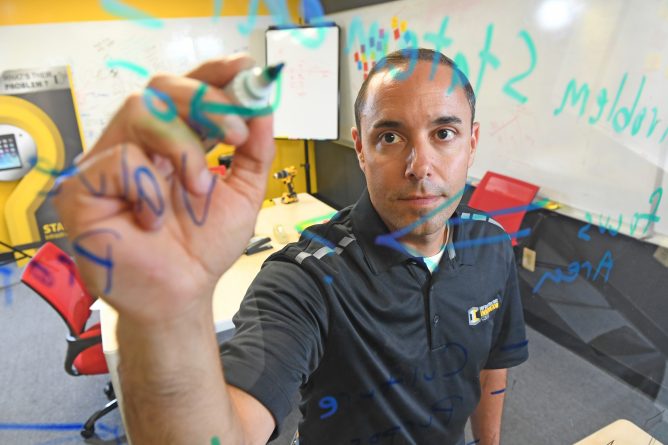In pursuit of innovation, alum is transformed personally and professionally
By Laura Braddick
Every morning, Frank DeSantis ’99 (BUAD) gets out of bed and goes to work with one goal in mind: completely disrupting Stanley Black & Decker—an S&P 500 company with a 174-year history and a diversified global provider of hand tools, power tools, security solutions, engineered fastening systems and more.
It’s not far-fetched considering Uber, Netflix and other game-changers have proved that no company or industry is safe from total disruption.
The difference is that DeSantis is working on the inside.
As vice president of breakthrough innovation, DeSantis helped develop Stanley Black & Decker’s internal team dedicated solely to researching, testing and vetting entirely new ideas, technologies and products that don’t yet exist in the marketplace.
Innovation is a tradition at Stanley Black & Decker, which created the first cordless drill and sent a drill to the moon, says DeSantis. But the breakthrough innovation teams are different, he explains.
“Core innovation looks at how to make a drill lighter, more powerful, more efficient. But what if a drill becomes obsolete?” DeSantis asks. “What we’re looking at is how we can put ourselves out of business before anyone else does. The hope is we’re visionaries and can look forward enough that when the technologies converge with the commercialization piece of it, we are going to produce something huge for the company.”
Building an innovation team in a corporate environment was no easy task.
“How we can put ourselves out of business before anyone else does?”
“They didn’t know what we needed, so we went out to find that,” DeSantis says. “We built an offsite location and assembled a team. We networked with local communities to learn about the entrepreneurial ecosystem here in Baltimore and the surrounding area. We went in search of what it truly means to be a startup.”
DeSantis and his manager visited innovation centers across the United States to see what startups were doing and brought all their ideas back. The concept grew into a network of six innovation centers across the country—the Towson location overseen by DeSantis himself. Engineers, software experts and other specialists were recruited from outside the company.
While company leadership was behind the initiative, getting other business units sold on the idea wasn’t as easy. Measuring success and outcomes is also starkly different for breakthrough innovation.
“A lot of times with product development, leadership is going to ask, ‘What’s it going to get me?’ Well, for us, the ‘give me’ sometimes is the learning,” DeSantis says. “It’s not going to produce anything in the traditional ROI sense, but we’re going to learn about the technology so we can apply it in the future.
“My goal was to have short-term wins that could show results, so the business unit could see value in what we’re doing,” he adds.
In 2016, the company introduced the DeWALT FLEXVOLT battery that can be used with both 20V and 60V power tools and doubled up to power 120V tools. This first-to-market technology enabled an entire new line of cordless products, including table and miter saws, and it all stemmed from one of the breakthrough innovation centers.
“We need to think so big that nobody else has thought about it. But in that big thinking you’re going to fail a lot. Our leadership team does give us the autonomy to do that. It’s fun, but it’s very, very hard.”
AN ENTREPRENEUR IS MADE
DeSantis met a recruiter from what was then Black & Decker at a career fair during his senior year at TU.
“I didn’t know what I wanted to be when I grew up,” he says. “Selling tools didn’t seem like the worst job in the world.”
After graduation, DeSantis went to work as a field service representative, driving a big yellow truck to visit construction sites and talk to site managers and contractors.
“It really got me acclimated to who the DeWALT end users were,” he recalls. “I watched them use the tools and saw what their frustrations were.”
“I was very uncomfortable with risk.”
From there, DeSantis became a field supervisor for Lowes, working with store managers to merchandise and sell products. He later became a facility training manager, training employees and external customers how to use new products. Eventually he worked his way to corporate marketing, then later to product development and brand marketing.
With a wealth of on-the-job training, DeSantis was satisfied with his place and career trajectory. So when Stanley Black & Decker tapped him to help lead the creation of the breakthrough innovation team, he said it wasn’t a role he was raising his hand for.
“We do profile assessments, and my profile was very interpersonal, non-technical and not a risk taker. I was very uncomfortable with risk,” he says. “I liked the security of a large company. I was comfortable.”
Almost three years into his innovation roles, DeSantis has zero regrets about taking on the challenge. The opportunity has transformed him both professionally and personally.
“It’s put a newfound interest in my desires, my career, my personal growth—building my network to a whole host of people I never knew existed in Towson and Baltimore,” he says. “I don’t think it would have been possible in any other role.
“I’ve gotten an entrepreneurial spirit and startup mentality without having to go out and live through all the risks and heartache.”


